Introduction
The world of work is changing fast. Things like machine learning, the gig economy and shifting expectations of employees are reshaping the priorities of businesses. And with 51% of employees looking to leave their jobs*, holding on to the best and brightest is a strategic imperative. Creating the right employee experience is the key to good retention – and is a necessity for sustainable businesses. This is where the importance of talent management comes into play.
87% of millennials rate “career development and personal growth” as the key criteria for them in a job. “Opportunities to learn and grow” is one of the top three factors to retain them.
Today’s workers also think differently about work. One survey found that 87% of millennials rank career development and personal growth as the key criteria for staying at a job. Most astoundingly, people are job hopping like never before, only staying an average of 1.8 years at the biggest tech companies.
To attract and retain top talent, today’s companies are committing themselves to making fundamental changes to their performance management systems. Organizations realize that employee evaluation programs need to be adaptable to a company’s unique culture, data-driven to provide key insights about people’s performance, and based on a single interface to provide managers with the big picture about how their team members are doing – and feeling.
Are companies actually following through on these commitments to revolutionize their talent management practices? That’s what this survey seeks to find out.
CIPD and HiBob conducted a survey of senior HR professionals from the UK to explore performance management practices specifically related to performance reviews, performance criteria, and other performance management issues. The respondents include senior HR managers from companies in various industries ranging from 200 to 1000 employees. The results show several key trends among employers in terms of their performance management practices.
Key findings
Any outliers or invalid data were also eliminated, yielding a final data set of 61 participants. All quantitative data was analyzed using statistical software to ensure data validity and reliability. This report shows several frequencies and response distributions. Breakouts of data are provided for industry and number of employees.
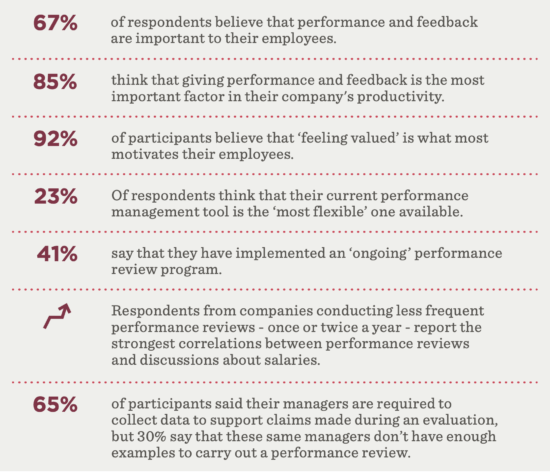
Employee motivation
Employee motivation is crucial for any company’s success. A survey conducted by Mercer in 2017 revealed that, 97% of employees want to be recognized and rewarded for a wide range of contributions, not just financial results or activity metrics — but only 51% say that their company does this well.
In our survey, 97% of participants believe that ‘feeling valued’ is what
most motivates their employees. Interestingly, salary considerations
rank third, behind ‘learning and development’, as primary motivators.
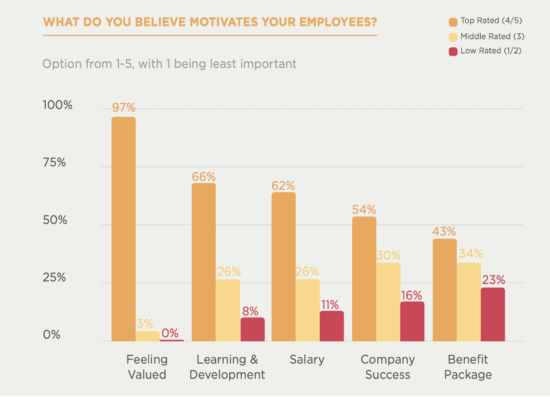
The importance of good feedback
Giving feedback in the workplace is key to running a successful organization.
Despite its importance, it is the most underused management tool.
Recognition directly affects
engagement, is a great retention
tool, and has a direct impact on
the success of the employee
and the business.
In the survey An overwhelming majority of respondents believe that feedback and performance are critical to their company’s productivity and success. 67% assert that performance and feedback are the primary drivers of their organizations’ long term growth prospects.
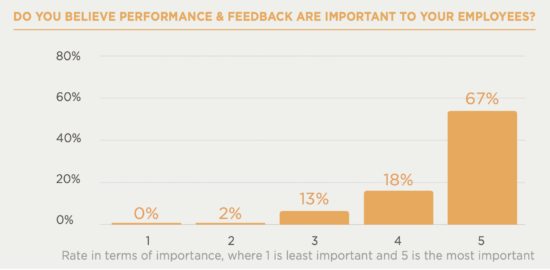
Reviews and raises
The connection between performance and salary raise
is worth looking into.
Respondents from companies conducting twice-yearly or annual
evaluations report the strongest correlation between performance
reviews and discussions about raises.
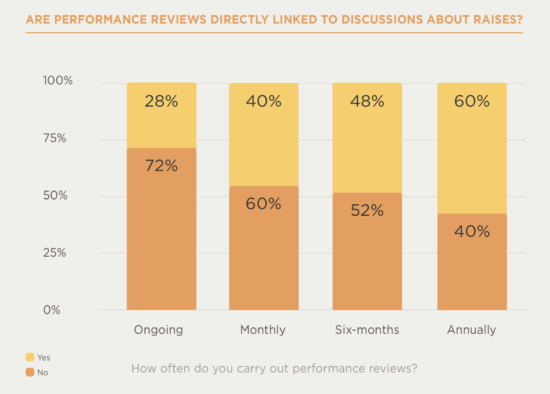
Reviews by data
69% of participants who said their managers are required to collect data to support claims made during an evaluation also say that these same managers don’t have enough examples to carry out a performance review. These results speak to a serious disconnect between organizational intentions for their performance reviews and systemic limitations regarding the gathering and processing of important people information.
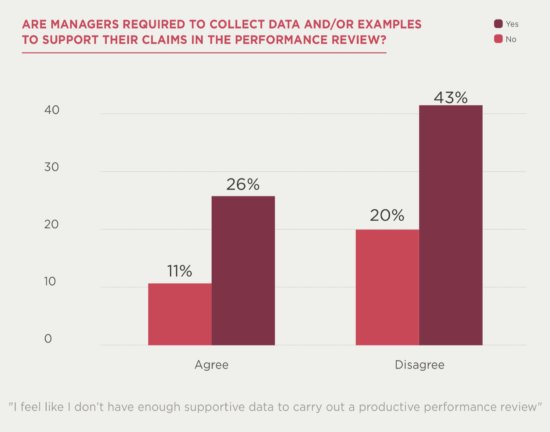
Flexibility
Today flexibility, personalization and agile processes are a must for organizations.
Employers utilize a variety of activities and processes in their performance
management programs, but certain methods tend to dominate year after
year. This survey found that a mere 8.2% of companies use a performance
management system that they define as the ‘most flexible’ on the market.
A majority, 54.10%, rate their evaluation systems as passably flexible.
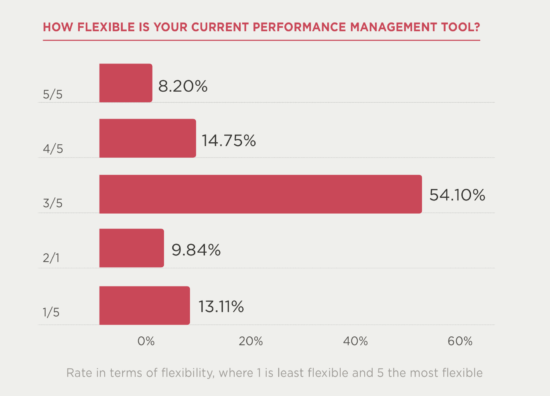
Frequency
A majority (63%) of those surveyed say that they conduct twice-yearly
performance reviews or less. Meanwhile, only (8%) of participants conduct
monthly surveys. Despite their growing popularity, only (30%) say that
they have an ‘ongoing’ performance review program in place.
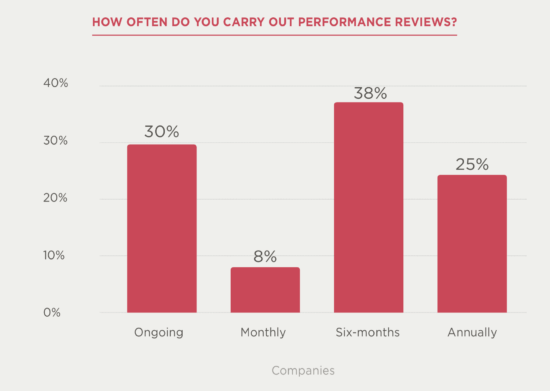
According to the Mercer report – continuous feedback is also becoming prevalent, no doubt enabled by technology, with 81% of companies having already put in place an “anytime feedback” tool or planning to do so this year.
Recommended For Further Reading
Conclusion
What this study reveals is the existence of a substantial lag time between
knowledge about the weaknesses of current talent management platforms
and acting on this realization.
In this survey we see that managers understand the need to gather
and analyze data on employee data, but don’t have the tools to do so. Similarly, HR professionals, business leaders and department heads grasp the powerful link between feedback and productivity, yet this study shows that ongoing reviews rank second in usage, behind biannual valuations. Most surprisingly, less than 10% of respondents think that their performance management tool is as flexible as it needs to be.
Adaptability + Data = Retention
When it comes to employee retention, there are effective automated
tools on the market that are helping companies boost engagement
through more individualized, data-driven performance reviews.
This survey reveals a general awareness of such tools and their
effectiveness.
Using an adaptable and user-friendly performance management
system is crucial to an organizations long-term viability.
About us

The CIPD is a professional body of experts that specializes in working people. For more than 100 years, CIPD has been championing better work and working lives by setting professional standards for HR and people development, as well as driving positive change in the world of work.
With hubs in the UK, Ireland, Middle East and Asia, CIPD is career partner of choice for 150,000 members around the world. This organization is the only body in the world that can award the prestigious chartered status to individual HR and L&D professionals. And CIPD’s independent research and insights make it a trusted a trusted adviser to governments and employers. cipd.co.uk

Bob is a people management platform that helps forward thinking businesses bring out the best in their employees. Bob radically streamlines admin and improves employees’ experiences with a smart mobile app,
and inviting onboarding and survey tools. The real-time data in Bob gives decision-makers valuable insights and helps employees feel more connected to the people they work with – wherever they are in the world. For more information about Bob, please visit hibob.com.
For More Information
[email protected]
US: +1 9176510048
UK: +44 20 3455 5024
